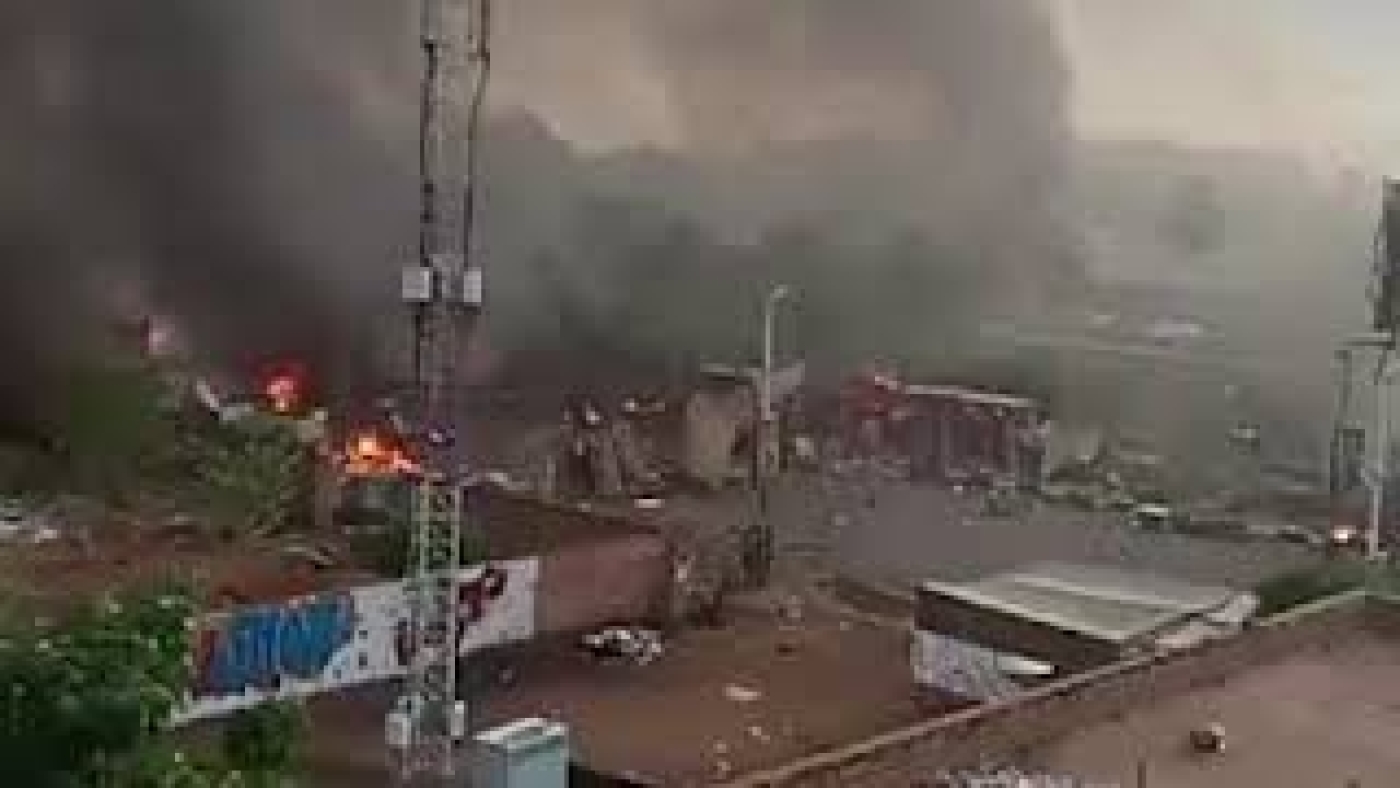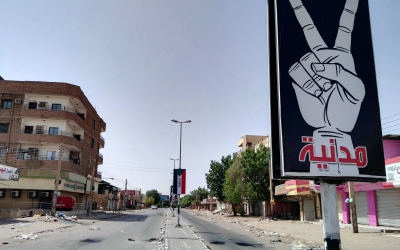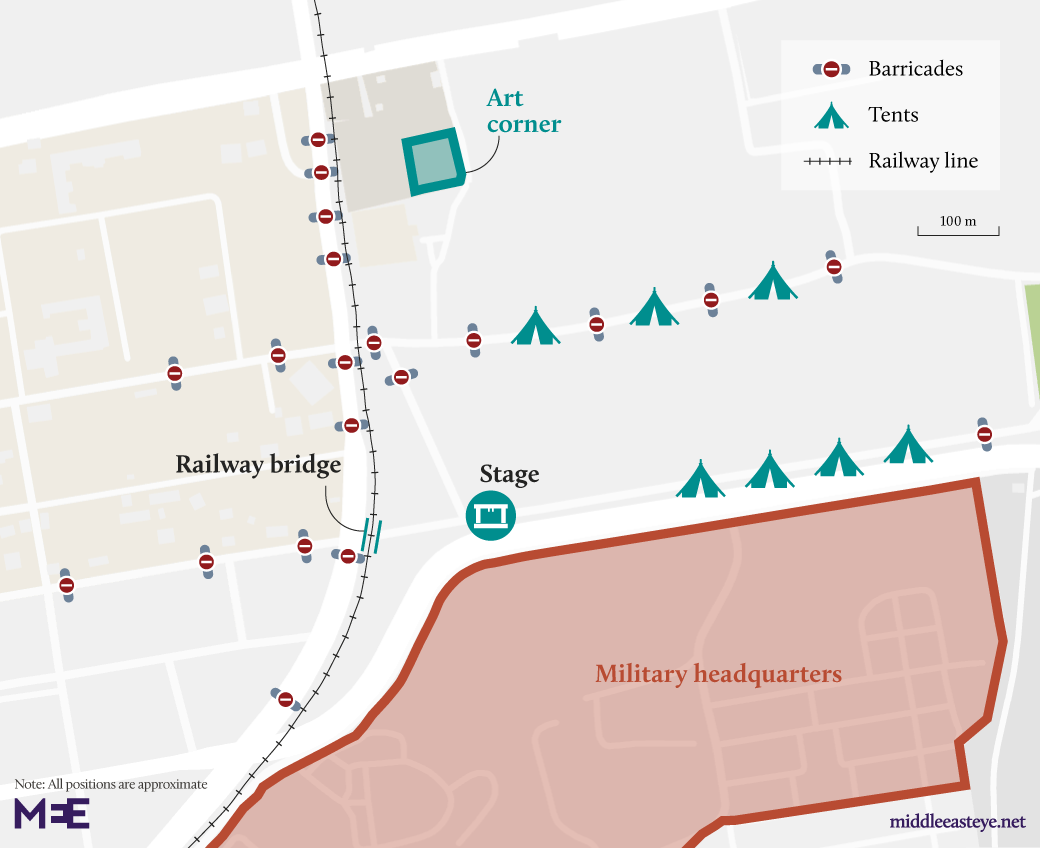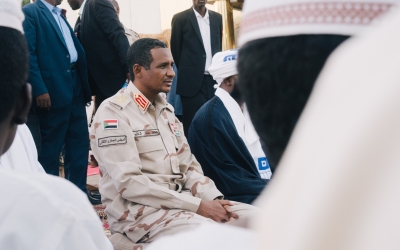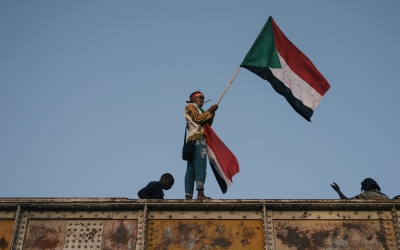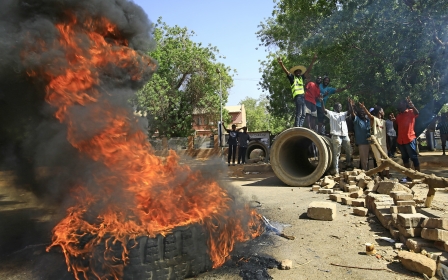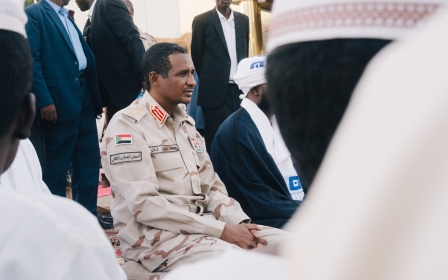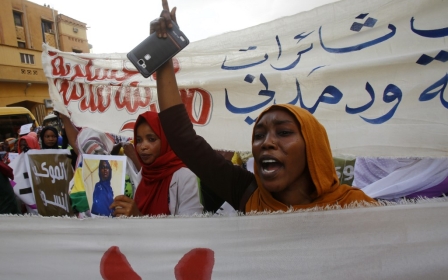Sudanese security forces use deadly violence against Khartoum protesters
At least 13 people have been killed and scores more injured after heavily armed Sudanese security forces firing live ammunition attempted to disperse a weeks-old sit-in by protesters outside the army headquarters in Khartoum, opposition-aligned doctors said on Monday.
Those killed included an eight-year-old child, the committee said. At least 116 people were injured in the raid, which started early on Monday morning, the Central Committee of Sudanese Doctors said on its Facebook page.
New MEE newsletter: Jerusalem Dispatch
Sign up to get the latest insights and analysis on Israel-Palestine, alongside Turkey Unpacked and other MEE newsletters
Middle East Eye has not independently verified the death toll.
Video of the protest site posted online by activists showed burning tents and abandoned barricades inside the previously bustling protest site which had become a focal point for opposition calls for Sudan's military council to step down in favour of civilian rule. The sound of gunfire could also be heard.
In statements, an opposition umbrella group said it was cutting contact with Sudan's ruling military council in response to the violence, and said that the site had been cleared of protesters.
It said that Rapid Support Forces (RSF) militia units, and members of the army and the police force, were involved in the raid. The RSF is under the command of Mohamed Hamdan Dagolo, commonly known as Hemeti, who is the vice president and most publicly visible member of the military council.
"We announce the end of all political contact and negotiations with the putschist Council," said the Alliance for Freedom and Change.
The Sudanese Professional Association, which has played a leading role in months of protests calling first for the toppling of former president Omar al-Bashir and then a transition to civilian rule, described the killings as a "bloody massacre" and called for "total civil disobedience" against the military council.
Regional analyst Rashid Abdi, a former Horn of Africa project director for Crisis Group, told MEE that the risk of violence escalating is real, and said the crackdown suggested that the military council had never been serious about giving up power.
"It wants a solution on its own terms. And that was not palatable to [the] protest movement. Instead of compromise it opted for violence," he said.
Sudan's Transitional Military Council (TMC), which assumed power when the military toppled Bashir in April after three decades in office, said on Monday that criminal elements near the protest site were targeted in a raid by security forces, denying that authorities were trying to clear the camp.
"We did not disperse the sit-in by force," Lieutenant General Shams El Din Kabbashi told Abu Dhabi-based Sky News Arabia.
"The tents are there, and the youth are moving freely."
Kabbashi suggested that Monday's raid was linked to a previous operation by security forces on Saturday targeting a neighbourhood close to the protest site dubbed "Colombia" which is known for its liberal attitude to drugs and alcohol, but which the military council said had become a "haven for outlaws".
"Many escaped from the Colombia area and entered the area of the sit-in... and as a result many of the youth left the area," said Kabbashi.
The council had repeatedly said it would not use force to disperse the protesters, often comprising thousands of young men and women who take turns camping outside the army headquarters.
A leader of Sudan's protest movement called the storming of the protest camp a "coup" against the uprising that led to the ousting of Bashir.
"We will confront it by escalating protests, marches and full civil disobedience," said Khalid Omar Yousef, a leader of the Declaration of Freedom and Change Forces.
In a Twitter post, the British Ambassador in Khartoum said he was "extremely concerned by the heavy gunfire I've been hearing over the last hour from my residence and reports that Sudanese security forces are attacking the protest sit-in site resulting in casualties".
British Foreign Minister Jeremy Hunt said that the Sudan's military council would be "held accountable by the international community".
US says attacks must stop
The violence comes amid a deadlock in talks between protesters and military leaders over demands to hand over power to civilians.
The military council has offered to let protesters form a government to run the country but insists on maintaining overall authority during an interim period.
Demonstrators want civilians to run the transitional period and lead the country of 40 million to democracy.
"Sudanese security forces' attacks against protesters and other civilians is wrong and must stop," the US embassy in Khartoum wrote on Twitter on Monday.
"Responsibility falls on the TMC. The TMC cannot responsibly lead the people of Sudan."
Egypt's foreign ministry said it was watching developments in its southern neighbour with "great interest".
"Egypt also underscores the importance that all Sudanese sides commit to calm, self-restraint and return to the negotiating table," it added.
The European Union also said it was following the situation closely.
"Any decision to intensify the use of force can only derail the political process. The European Union's priority remains the rapid transfer of power to a civilian authority," a spokesperson said.
Later on Monday, the head of the United Nations High Commissioner for Human Rights said she "utterly deplored" the reports that the Sudanese military had attacked the Khartoum protest camp.
“The protestors in Sudan have over the past few months been an inspiration, peacefully demonstrating and working to engage with the Transitional Military Council,” said Michele Bachelet, in a statement.
"I utterly deplore the apparent use of excessive force in the protest camps. Reports that live ammunition was used by security forces next to, and even inside, medical facilities are extremely alarming. I urge the security forces to immediately halt such attacks, and to ensure safe, unimpeded access to medical care for all."
Nile bridges blocked
Live footage broadcast by Arab television stations showed chaotic scenes, with protesters running away as black smoke rose from tents apparently torched by the raiding force.
Demonstrators, some waving Sudanese flags, hurled stones at security forces, who charged amid sounds of intense gunfire.
A video posted on social media showed one protester collapse to the ground, crying in pain after being hit by what appears to be live fire.
A Reuters witness saw troops wielding batons, including riot police and members of the paramilitary RSF, deploy in central Khartoum and close roads, apparently to try to block people from reaching the protest site.
Nile bridges that connect various parts of the Sudanese capital have also been blocked.
A witness living in the Burri neighbourhood in east Khartoum said he could "hear the sound of gunfire and I see a plume of smoke rising from the area of the sit-in".
Another resident of the area, which is near the sit-in, said he had seen forces in "police uniform" trying to expel the demonstrators, the AFP news agency reported.
In Khartoum's twin city of Omdurman, across the Nile, thousands of people took to the streets, blocking roads with stones and burning tyres, a Reuters witness said.
The sit-in had become the focal point of protests that started in December, sparked by a severe financial crisis that caused cash shortages and bread price hikes, evolving first into a movement calling for Bashir to go, and then for civilian rule and democracy in place of the council that replaced him.
Middle East Eye delivers independent and unrivalled coverage and analysis of the Middle East, North Africa and beyond. To learn more about republishing this content and the associated fees, please fill out this form. More about MEE can be found here.


